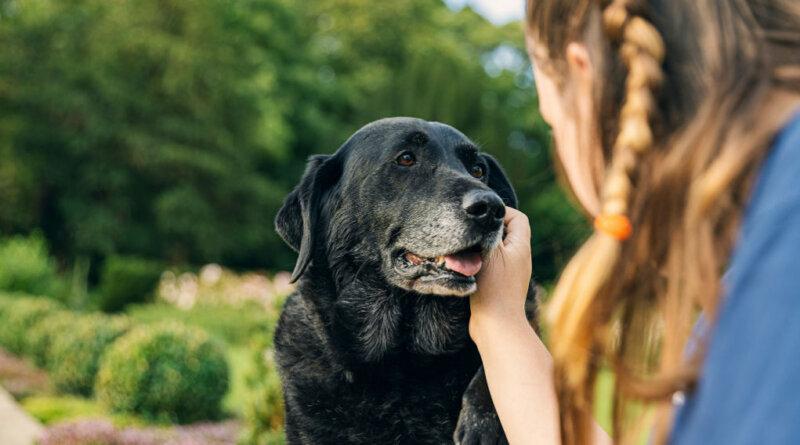Dog Dementia Support Groups – Top Dog Tips
DOG DEMENTIA SUPPORT GROUPS are getting more and more popular these days.
Which is a good thing, considering Canine Cognitive Dysfunction or Dementia in Dogs is a common condition, especially for senior dogs.
A University of Sydney study in Australia reported that about 14% of dogs develop Dementia, but only 2% are diagnosed. And their risk increases as they get older—equivalent to about 68% prevalence among elderly dogs.
That’s why thanks to dog dementia support groups, dog owners can now have the support system they need apart from their family members.
After all, mental health talks aren’t just as important for humans; they’re also equally crucial for our canine friends.
In this article, we listed different groups in America that raise awareness about dog dementia and give support to dogs and dog owners going through this difficult stage in their lives.
What are Dog Dementia Support Groups?
Support groups are an avenue for people with similar experiences to come together to share feelings, coping strategies, and firsthand information about the condition or experiences they share.
As we know, getting emotional support during tough times is as important as getting medical attention from experts.
Sometimes, just being able to sit with and talk to people who know what you’re personally going through is enough to make you feel better—more so if they are survivors with inspirational stories to tell.
There are definitely benefits to joining support groups not only for humans but also for canine conditions like dog dementia.
RELATED: Is Your Dog Suffering From Canine Dementia?
Benefits of Joining Dog Dementia Support Groups
According to Mayo Clinic, there are sure benefits to joining support groups in general.
- Feeling less lonely, isolated, or judged
- Reducing distress, depression, anxiety, or fatigue
- Talking openly and honestly about your feelings
- Sharing firsthand knowledge about the condition
- Learning or improving skills to cope with challenges
- Knowing about helpful products for daily living
- Staying motivated to manage and stick to treatment plans
- Gaining a sense of empowerment or control
- Improving understanding of a disease and your own experience with it
- Getting practical feedback about treatment options
- Learning about health, economic, or social resources
- Gaining hope for the future
While it’s normal to feel overwhelmed and stressed by the changes in your furry friend’s behavior, remember that there are people who can and will understand your situation.
Now, to be straightforward with you: there is unfortunately no known cure for Canine Cognitive Dysfunction.
Its progress can only be slowed down with the help of various treatments and medications.
But getting a diagnosis doesn’t mean the end of the line for your dog, either.
Joining dog dementia support groups will definitely not only help you cope; they can also help your dog feel better.
RELATED: Dementia in Dogs: Signs, Causes, and Treatment
How to Find the Right Support Group for You and Your Dog with Dementia
Support groups these days have different formats: it could be an in-person, by-schedule meeting where members meet face-to-face at a specific location.
The downside here is the meeting place may be too far from where you live, or you’re not available during the time and date of the meeting.
It can also be an online support group that’s more convenient and available all the time, yet potentially lack the personalized support and more connecting experience you are looking for.
There are definitely pros and cons to each format, but they both aim for the same thing: to provide support and guidance during times when things get overwhelming.
To get started, you can ask the veterinary clinic or hospital you and your dog frequent if they are affiliated with or at least familiar with any support groups for canine dementia.
Sometimes, your veterinarian will also give out this information if he knows one.
There are also non-profit organizations across the country that advocate for the welfare and knowledge about Cognitive Canine Dysfunction, and national institutions that conduct studies and research on animal welfare in general.
RELATED: Dog Dementia Checklist
Dog Dementia Support Groups
Different groups offer in-person or online support groups for canine dementia, but it should not be confused with organizations for service dogs who support people with dementia. (They’re different!)
You can check out these websites to see which dog dementia support group you can join.
Meet Up for Senior Dogs 
Local organizations in states or cities sometimes organize Meet Up groups for people with common ground.
Example are these scheduled meet-ups for senior dog owners in different states that deals with specific requirements of owning elderly dogs.
Here, they can discuss how to cope with their aging dogs, grief issues over losing furry friends, canine health issues like dementia, etc.
There are also hundreds of meet-ups specifically dedicated to Pet Care in general.
And if you can’t find one near you, you can help organize one instead!
Dog Dementia: Help and Support 
This website is made by Eileen Anderson, a fur parent who had a dog with dementia.
Here she shares information about Canine Cognitive Dysfunction and some general tips on how to care for senior dogs.
She also has photos and videos to show the symptoms of dog dementia from her dog Cricket’s experience.
And most important of all—she opened this to become a platform for fellow owners of dogs with dementia to share their experiences.

You can also find Dog Dementia: Help and Support on Facebook.
Canine Cognitive Dysfunction (CCD) Support Group
These days, social media has become an avenue too for online support groups to exist, like this private group on Facebook called Canine Cognitive Dysfunction (CCD) Support Group.
This group was created in May 2014 and yet is still growing in membership up to this day.
Currently, there are 15,900 members sharing photos, videos, and stories of their dogs with dementia.
Dog Aging Project
While this is not technically a support group, Dog Aging Project can still help you find an understanding community to assist you and your aged dog wade through canine dementia.
Not only that, but you can also give back to the community by participating in different studies meant to find medical breakthroughs for both men and dogs.
RELATED: Dog Dementia Stages: What You Need To Know
FAQs on Dog Dementia Support Groups
How long can a dog live with dog dementia?
Ultimately, it’s difficult to predict the life expectancy of a dog with dementia.
It all depends on the overall health and welfare of the dog after all, and how fast their cognitive abilities deteriorate.
However, there are those claiming that dogs with dementia can actually live for approximately up to 2 years.
As we know, dementia can really affect a dog’s quality of life and it can only be a matter of months or years.
Keep working with your veterinarian to monitor your dog’s health and cognitive functioning.
What to do with dogs that have dementia?
Just because their mental capabilities are deteriorating doesn’t mean dogs with dementia wouldn’t want to do the activities they enjoy doing when they were younger.
It’s still important to keep them on their routine, especially the activities that will stimulate them both physically and mentally.
Expose them to sunlight too by allowing them outdoor activities. This will help regulate their sleep-wake cycle.
Most importantly, don’t forget to visit the vet, and give your dog the prescribed medications and supplements to help slow down the progression of dementia.
Are dogs with dementia unhappy?
Dogs love being dogs. They love to be able to play, run around, and cuddle with their humans.
Dogs function at an intuitive level. But unfortunately, dementia can affect that.
When their sense of identity, purpose, and joy are affected, they may feel confused and unhappy.
This is why it’s important that they get the support they most need from us, their owners.
Should you euthanize a dog with dementia?
Having a quality of life is important for dogs.
When they can no longer do the things they enjoy despite your full effort, and when they seem to be deteriorating rapidly mentally and physically, check with your vet if there’s anything else that can be done.
If there’s none, this may be the best time to consider putting them to sleep.
However, remember that there are a lot of success stories in dog dementia support groups you can take inspiration from to not lose all hope!
Also, you can read this Checklist for When to Put Your Dog Down.
What triggers dementia in dogs?
In truth, there is no known exact cause of why dementia happens in dogs.
Experts only know that aging is the main trigger point that affects brain function as physical and chemical changes occur along with getting old.
How quickly does canine dementia progress?
The progression of dementia is on a case-to-case basis.
However, in general, experts say that about a quarter of the dogs who had been diagnosed with mild dementia progress to moderate dementia in only 6 months.
This is about 5-times faster than the progression of Alzheimer’s disease in humans.
Researchers say this may also be because a dog’s average life expectancy is also 5 times faster than a human’s.
Dog Dementia Support Groups — Final Thoughts
If you and your dog are going through a rough patch these days, know that you are not alone.
There are several dog dementia support groups that you can join to help you both not only feel better but to guide you as well through this new chapter in your life.
Just remember to always hope for the best and prepare for the worst.
You got this!
READ NEXT: Improving Quality of Life for Senior Dogs
Related








